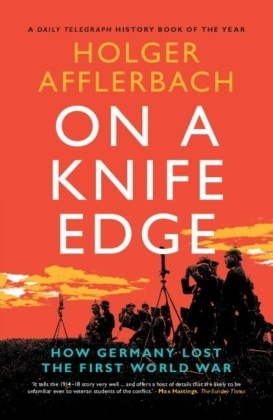
On a Knife Edge - How Germany Lost the First World War
| Verlag | Cambridge University Press |
| Auflage | 2024 |
| Seiten | 566 |
| Format | 13,0 x 3,5 x 19,5 cm |
| Gewicht | 740 g |
| Artikeltyp | Englisches Buch |
| Reihe | Cambridge Military Histories |
| EAN | 9781108965866 |
| Bestell-Nr | 10896586UA |
A fundamental reassessment of German politics and strategy during the First World War and why it was that Germany lost.
Was the outcome of the First World War on a knife edge? In this major new account of German wartime politics and strategy Holger Afflerbach argues that the outcome of the war was actually in the balance until relatively late in the war. Using new evidence from diaries, letters and memoirs, he fundamentally revises our understanding of German strategy from the decision to go to war and the failure of the western offensive to the radicalisation of Germany's war effort under Hindenburg and Ludendorff and the ultimate collapse of the Central Powers. He uncovers the struggles in wartime Germany between supporters of peace and hardliners who wanted to fight to the finish. He suggests that Germany was not nearly as committed to all-out conquest as previous accounts argue. Numerous German peace advances could have offered the opportunity to end the war before it dragged Europe into the abyss.
Inhaltsverzeichnis:
Introduction; Part I. Hybris: 1. The Road to War; 2. 'It can hardly go wrong now': The Schlieffen Plan and its Failure; 3. Tannenberg and the Rise of Hindenburg; 4. The European Stalemate; 5. A Strategy of Muddling Through? The War in 1915; 6. 'An Unparalleled Act of Barbarism': The Naval Blockade, Submarine Warfare and the Battle for American Neutrality; 7. 'Potato-bread Spirit': The German Home Front in 1914-16; 8. Squaring the Circle: Falkenhayn and Verdun 1916; 9. Summer 1916: The Allied Attack on all Fronts and its Failure; Part II. Climax: At the apex of war: 10. 'Only a Miracle can Save us Now': Germany and the War in the autumn of 1916; 11. Action Stations, Panic Stations: The Radicalisation of Germany's Strategy under the Third OHL; 12. 'A Stroke of Genius': Tentative Offers of Peace in December 1916; 13. The misjudged stand-off: Unrestricted submarine warfare and the USA's entry into the war; Part III. Nemesis: The defeat of the Central Powers and the destruction of the European Order: 14. Military Developments in the First Half of 1917; 15. The First Russian Revolution and the Opportunity for a Peace Agreement with the Russian Democracy; 16. 'War Psychosis?' The Reichstag's Peace Offer and Bethmann Hollweg's Demission; 17. 'The Unmasking of the Central Powers?' Victory and Peace in the East; 18. 'Glorious, but hopeless': Germany's Position at the Turn of the Year 1917/18; 19. 'Ludendorff's Hammer': The Western Offensive of 1918; 20. 'Now the War was Lost': The Military Collapse of the Central Powers; 21. 'Savage in Victory, Contemptuous in Defeat': Germany's Route out of the War; The Final Reckoning: A Terrible Debt that Must be Paid.
Rezension:
'All future historians of the First World War will have to engage with Holger Afflerbach's important and authoritative book, and his powerful and provocative case that the conflict was more of a 'close run thing' than previously thought.' Jonathan Boff, author of Haig's Enemy: Crown Prince Rupprecht and Germany's War on the Western Front
